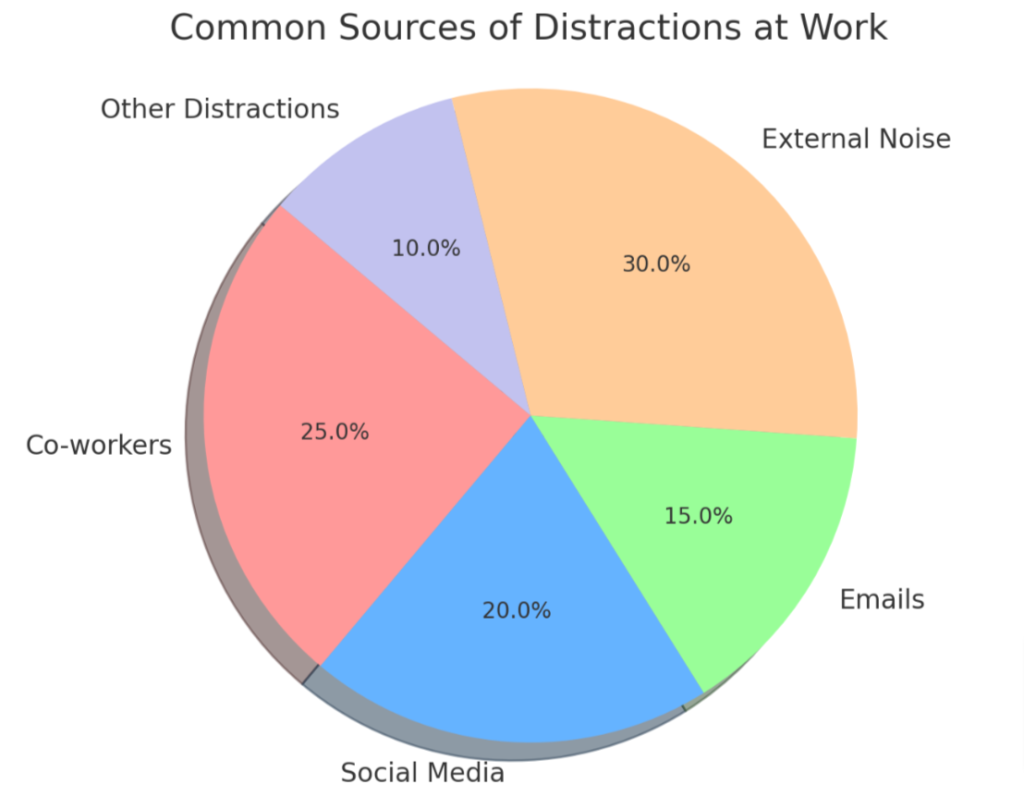Mastering Focus: Strategies to Overcome Distractions and Boost Concentration
Do you ever feel like distractions are overtaking your productivity, and keeping you from completing tasks? Fact: studies show that the average person gets distracted every 40 seconds when working in front of a computer.
This blog post is designed to equip you with practical strategies to eliminate those pesky distractions and sharpen your focus. Ready to reclaim control over your time and up your productivity game? Let’s dive in!
Key Takeaways
- Establish boundaries and communicate effectively with co – workers to minimize distractions.
- Create a schedule or to – do list to prioritize tasks and manage time efficiently.
- Turn off alerts on devices to create a distraction – free environment.
Common Sources of Distractions
Co-workers, pointless meetings, hunger and dehydration, multi-tasking, stress, anxiety, depression, and remote work distractions can all hinder our ability to stay focused.
Co-workers
Interactions with co-workers can often distract you from your task at hand. Office politics, casual chitchat, or even requests for assistance may pull your focus away from what you need to do.
It’s vital to establish boundaries and communicate effectively about your workload without seeming anti-social. Investing in a pair of noise-cancelling headphones could help signal that you’re engaged in deep work.
Alternatively, scheduling times throughout the day for socializing and collaboration lets you manage interruptions while maintaining good relationships with colleagues.
Pointless meetings
Frequently, office productivity suffers due to pointless meetings. These sessions often go off track and rarely lead to concrete results or task completion. Employees find themselves stuck in a conference room, unengaged, checking their emails instead of actively participating.
Strategies can be implemented to limit unnecessary meetings and increase work efficiency. A clear agenda helps focus the discussion while time restrictions ensure conversations stay on topic.
If you suspect a meeting is without purpose, consider suggesting alternatives such as email updates or one-on-one catch ups.
Hunger and dehydration
Physical needs like hunger and dehydration can disrupt your concentration significantly. You might not notice it at first, but the growling stomach or dry throat detracts from your productivity.
Maintaining a proper diet and staying hydrated boosts your energy levels, enhancing focus and task completion. Keep healthy snacks nearby during work hours for moments of hunger pangs.
Regular water consumption throughout the day is crucial too; it maintains optimum brain function and prevents dehydration, which often leads to headaches or dizziness that can pull you out of your workflow.
Therefore, remember to nurture your body well while striving for work efficiency; this includes eating balanced meals at set times and drinking plenty of water daily.
Multi-tasking
Trying to juggle multiple tasks at once may seem like a way to get more done, but it can actually hinder productivity and increase distractions. When we try to multi-task, our attention becomes divided, making it harder to concentrate on any one task.
In order to eliminate distractions and stay focused, it’s important to prioritize tasks and tackle them one at a time. By focusing solely on each task in front of you, you’ll be able to complete them more efficiently and with better quality.
So instead of trying to do everything at once, take a step back, prioritize your tasks, and give each one your full attention before moving on – you’ll find yourself staying more productive in the long run.
Stress, anxiety, and depression
Stress, anxiety, and depression can significantly impact our ability to stay focused and productive. These mental health challenges often lead to racing thoughts, difficulty concentrating, and feelings of overwhelm.
By recognizing these triggers and implementing coping strategies such as deep breathing exercises or mindfulness techniques, we can better manage our stress levels and create a more distraction-free environment for optimal focus and productivity.
Remote work distractions
Remote work can come with its fair share of distractions, but there are ways to overcome them and stay focused. One common distraction is social media. By limiting your use of smartphones and turning off notifications during work hours, you can minimize the temptation to constantly check for updates.
Another distraction is a noisy environment. Using headphones or finding a quiet space to work can help create a more productive atmosphere. Lastly, it’s important to establish boundaries with friends and family who may not realize that just because you’re home doesn’t mean you’re available for interruptions.
By setting clear expectations, you can minimize interruptions and create a distraction-free work environment.

Strategies to Avoid Distractions
To avoid distractions, make a schedule or to-do list outlining your tasks and deadlines.
Make a schedule/to-do list
Creating a schedule or to-do list helps you stay organized and on track with your tasks. This strategy allows you to prioritize your work and manage your time effectively. By breaking down your day into manageable chunks, you can focus on completing one task at a time and avoid getting overwhelmed. Additionally, having a visual representation of your tasks helps you stay motivated and track your progress throughout the day. So grab a pen and paper or use a digital tool to create your schedule or to-do list, and start checking off those tasks!
Turn off alerts
To eliminate distractions and stay focused, one effective strategy is to turn off alerts. Whether it’s email notifications, social media updates, or instant messaging pop-ups, these interruptions can severely disrupt your concentration and workflow.
By disabling these alerts on your devices, you create a distraction-free environment that allows you to focus solely on the task at hand. This simple step promotes better time management and mental focus, boosting productivity and helping you complete tasks more efficiently.
So take control of your notifications and experience improved concentration by turning them off during work periods.
Use headphones
Use headphones to create a distraction-free environment and improve your focus. By wearing headphones, you can block out background noise and eliminate potential interruptions from co-workers or external distractions.
Choose a pair of comfortable headphones that fit well and provide good sound quality. Listening to instrumental music or white noise can also help enhance concentration and productivity.
Whether you’re in the office or working remotely, using headphones can be an effective tool for maintaining mental clarity and staying on task. So put on your favorite tunes or calming sounds, and let the power of focused listening boost your work efficiency.
In addition to blocking out distractions, using headphones while working can also signal to others that you are in a focused state and should not be disturbed unless it’s urgent. This visual cue helps set boundaries with colleagues, reducing unnecessary interruptions during critical tasks.
However, remember not to crank up the volume too high, as this could damage your hearing over time. Find a balance where you can still hear important notifications or calls while creating an environment conducive to deep work.
Find the right work environment
Create a productive work environment by choosing the right space for your tasks. A quiet area with minimal distractions can help improve concentration and focus. Consider finding a dedicated workspace, whether it’s a private office or a designated area in your home.
Experiment with different environments to see what works best for you – some people thrive in complete silence, while others prefer light background noise. Ultimately, finding the right work environment will enhance your productivity and efficiency throughout the day.
Keep a clear desk
A cluttered desk can be a major distraction when trying to stay focused. To maintain concentration and productivity, it’s important to keep a clear desk. Remove any unnecessary items or paperwork that may divert your attention from the task at hand.
Organize your workspace in a way that allows for easy access to essential tools and materials. By keeping your desk tidy, you create a distraction-free environment that promotes better focus and work efficiency.
Take breaks
Taking regular breaks is crucial for maintaining focus and productivity throughout the day. When we continuously work without pause, our brains can become fatigued, leading to diminished concentration and decreased efficiency.
By incorporating short breaks into your schedule, you give your mind a chance to recharge and refresh. Whether it’s a quick walk around the office or simply stepping away from your desk for a few minutes, these small moments of respite can make a big difference in reducing mental strain and improving overall performance.
So don’t forget to take breaks and give yourself that well-deserved breather – it will help you stay focused and accomplish tasks more effectively.

Limit smartphone use
To eliminate distractions and stay focused, it’s crucial to limit smartphone use. We all know how tempting it is to constantly check our phones for notifications, messages, or social media updates.
However, constantly being glued to our screens can hinder productivity and disrupt our train of thought. To combat this, consider setting specific times throughout the day when you can check your phone, such as during breaks or after completing a task.
By reducing smartphone usage and establishing boundaries with technology, you can create a distraction-free environment that promotes focus and enhances your work efficiency.
Tips to Improve Focus
Practice meditation to calm your mind and increase mental clarity.
Practice meditation
Meditation is a powerful practice that can help eliminate distractions and improve focus. By taking the time to sit quietly and focus on your breath or a specific mantra, you can train your mind to become more present and less easily swayed by outside thoughts or interruptions.
Regular meditation sessions can increase mental clarity, reduce stress, and enhance self-discipline, making it easier to stay focused throughout the day. Whether it’s a short five-minute session in the morning or a longer meditation break during the day, incorporating this practice into your routine can significantly boost productivity and concentration levels.
Set smaller goals
Setting smaller goals is a helpful strategy to eliminate distractions and stay focused. By breaking down larger tasks into smaller, more manageable goals, you can maintain a sense of progress and motivation. Here are some tips for setting smaller goals:
- Define specific milestones for each task.
- Divide your projects into actionable steps.
- Set realistic deadlines for completing each goal.
- Prioritize your tasks based on importance and urgency.
- Celebrate small achievements along the way.
Use visual reminders
Use visual reminders to help you stay focused and on task. Place sticky notes with important deadlines or tasks in your line of sight, whether it’s on your computer monitor or near your workspace.
You can also create a vision board with images that inspire you and represent your goals. Hang it somewhere visible so that you’re constantly reminded of what you’re working towards.
By incorporating visual cues into your work environment, you’ll be more likely to stay organized, motivated, and focused on completing the tasks at hand without getting easily distracted.
Another way to use visual reminders is by setting up a timer or a countdown clock. Set specific time intervals for each task or break, and display it where you can see it easily. This will keep you accountable and help track how much time you have left for each activity.
Additionally, consider using color coding to visually prioritize tasks on your schedule or calendar. Assign different colors for urgent deadlines, important meetings, and non-essential activities so that they stand out at a glance.
Reward yourself
One effective strategy to improve focus and motivation is to reward yourself. After completing a task or reaching a milestone, take some time to celebrate your accomplishments. It could be something as simple as treating yourself to a cup of coffee or taking a short break to do something you enjoy.
By incorporating rewards into your work routine, you create positive associations with staying focused and being productive. This can help boost your productivity and maintain your concentration throughout the day without feeling overwhelmed or burnt out.
Take a walk
Taking a walk can be a simple yet effective way to eliminate distractions and stay focused. Walking allows you to clear your mind, get some fresh air, and recharge your energy levels.
It provides a break from the constant stimulation of technology and gives you a chance to reflect on your thoughts without interruptions. Whether it’s a quick stroll around the office or a longer walk outside, taking this time for yourself can help improve concentration, boost productivity, and provide mental clarity needed for task completion.
Conclusion
In conclusion, by implementing strategies such as creating a schedule and turning off alerts, you can eliminate distractions and improve your focus. Taking regular breaks and practicing meditation can also help increase productivity and reduce stress.
With these techniques in place, you’ll be able to stay on track and complete tasks more efficiently.

